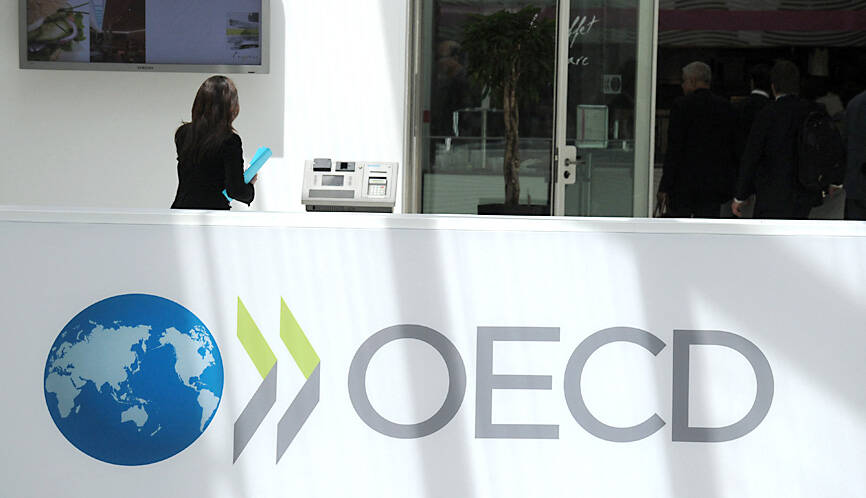The Organisation for Economic Co-operation and Development (OECD) yesterday warned that protectionist trade measures pose a major risk to the world economy, just weeks before US president-elect Donald Trump is to return to the White House next month.
The Paris-based OECD did not name Trump in its updated analysis of the world economy, but it was abundantly clear that the organization was warning about Trump’s possible tariff measures on US trading partners.
While the OECD raised its global growth forecast to 3.3 percent next year, it said that “greater trade protectionism, particularly from the largest economies” poses a “downside risk” along with geopolitical tensions and high public debts.

Photo: AFP
“Increases in trade-restrictive measures could raise costs and prices, deter investment, weaken innovation and ultimately lower growth,” the OECD said in its economic outlook.
“Further increases in global trade restrictions would add to import prices, raise production costs for businesses and reduce living standards for consumers,” it added.
A recent study by the Roland Berger consultancy calculated the cost of the US measures, and likely countermeasures by China and the EU, at more than US$2.1 trillion through 2029.
Trump is far from the only risk in terms of protectionist measures. A spat has also broken out between Brussels and Beijing after the EU imposed import tariffs on Chinese electric vehicles. China has retaliated with tariffs on EU brandy, including cognac.
The OECD sees the US economy expanding 2.4 percent next year, up from its September forecast of 1.6 percent growth. It also raised its forecast for the UK’s growth next year 0.5 percentage points to 1.7 percent due to higher public spending planned by the new Labour Party government.
China’s economy is expected to expand 4.7 percent next year, an increase of 0.2 percentage points, while India’s growth forecast was raised 0.1 percentage points to 6.9 percent.
However, France and Germany saw 0.3 percentage point cuts to their growth forecasts to 0.9 percent and 0.7 percent respectively, as both countries face political crises amid mounting fiscal pressure, the OECD said.

Nvidia Corp chief executive officer Jensen Huang (黃仁勳) on Monday introduced the company’s latest supercomputer platform, featuring six new chips made by Taiwan Semiconductor Manufacturing Co (TSMC, 台積電), saying that it is now “in full production.” “If Vera Rubin is going to be in time for this year, it must be in production by now, and so, today I can tell you that Vera Rubin is in full production,” Huang said during his keynote speech at CES in Las Vegas. The rollout of six concurrent chips for Vera Rubin — the company’s next-generation artificial intelligence (AI) computing platform — marks a strategic

REVENUE PERFORMANCE: Cloud and network products, and electronic components saw strong increases, while smart consumer electronics and computing products fell Hon Hai Precision Industry Co (鴻海精密) yesterday posted 26.51 percent quarterly growth in revenue for last quarter to NT$2.6 trillion (US$82.44 billion), the strongest on record for the period and above expectations, but the company forecast a slight revenue dip this quarter due to seasonal factors. On an annual basis, revenue last quarter grew 22.07 percent, the company said. Analysts on average estimated about NT$2.4 trillion increase. Hon Hai, which assembles servers for Nvidia Corp and iPhones for Apple Inc, is expanding its capacity in the US, adding artificial intelligence (AI) server production in Wisconsin and Texas, where it operates established campuses. This

US President Donald Trump on Friday blocked US photonics firm HieFo Corp’s US$3 million acquisition of assets in New Jersey-based aerospace and defense specialist Emcore Corp, citing national security and China-related concerns. In an order released by the White House, Trump said HieFo was “controlled by a citizen of the People’s Republic of China” and that its 2024 acquisition of Emcore’s businesses led the US president to believe that it might “take action that threatens to impair the national security of the United States.” The order did not name the person or detail Trump’s concerns. “The Transaction is hereby prohibited,”

Garment maker Makalot Industrial Co (聚陽) yesterday reported lower-than-expected fourth-quarter revenue of NT$7.93 billion (US$251.44 million), down 9.48 percent from NT$8.76 billion a year earlier. On a quarterly basis, revenue fell 10.83 percent from NT$8.89 billion, company data showed. The figure was also lower than market expectations of NT$8.05 billion, according to data compiled by Yuanta Securities Investment and Consulting Co (元大投顧), which had projected NT$8.22 billion. Makalot’s revenue this quarter would likely increase by a mid-teens percentage as the industry is entering its high season, Yuanta said. Overall, Makalot’s revenue last year totaled NT$34.43 billion, down 3.08 percent from its record NT$35.52